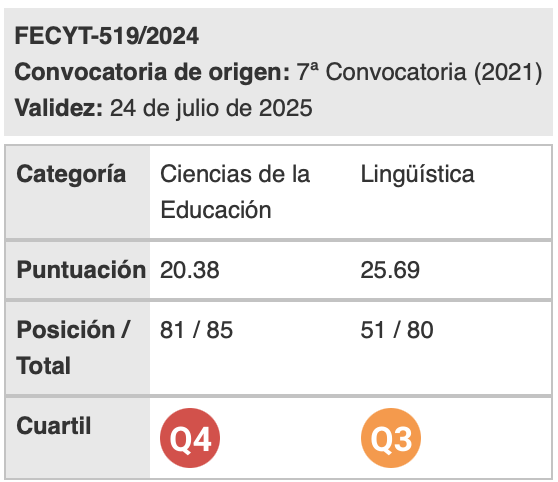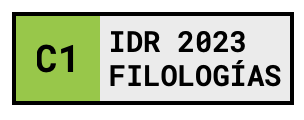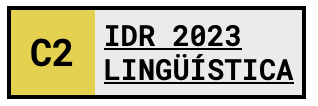The promotion of health and beauty tourism through websites: a linguistic analysis
Palabras clave:
tourism discourse, promotion, linguistic resources, advertising discourseResumen
In addition to magnificent beaches, history and culture, tourism websites also offer health and beauty centres for the tourists' wellbeing. This study examines the discourse for the promotion of health and beauty tourism. The purpose of this paper is to offer a general view of this type of discourse focusing on its linguistic resources (lexical-morphological, syntactic and stylistic) in order to better understand its main distinctive features. With this aim in mind we have analyzed websites related to the promotion of health and beauty tourism in Andalusia in English versions. The results of this study can be of relevance both to professional translators and particularly to students and teachers of translation, bearing in mind the emergence of health and beauty tourism as a new type of specialized discourse and the increasing probability that translators will be faced with texts of this nature.
Descargas
Citas
Adams, H. & Cruz García, L. (2007). The Advertising of Financial Products in the Press. Ibérica, 13, 123-146.
Alcaraz Varó, E. (2000). El inglés profesional y académico. Alianza Editorial: Madrid.
Borrueco, R. Ma. (2006). El discurso turístico: estudio lingüístico aplicado a la enseñanza de la traducción. Hieronymus Complutensis, 12, 69-78. Centro Virtual Cervantes.
Bowker, L. & Pearson, J. (2002). Working with Specialized Language: A practical guide to using corpora. Londres: Routledge.
Cabré Castellví, T. (1993). La terminología: teoría, metodología, aplicaciones. Barcelona: Antártida.
Calvi, M. V. (2009). Il discorso specialistico del turismo. In A. M. Di Liberti, V. Pecoraro & O. Sacco (Eds.), Atti della Giornata di Studi “Lingue e linguaggi del turismo” (pp. 7-17). Palermo: Carbone Editore.
Cappelli, G. (2006), Sun, Sea, Sex and the Unspoilt Countryside. How the English language makes tourists out of readers. Paris: Paris Publishing.
Cappelli, G. (2008). The translation of tourism-related websites and localization: problems and perspectives. In A. Baicchi (Ed.), Voices on Translation (pp. 97-115) RILA Rassegna Italiana di Linguistica Applicata, Roma: Bulzoni Editore.
Cook, G. (2001). The discourse of advertising. London: Routledge.
Cortés de los Ríos, M. E. & Azzahraa, F. (2014). The Construction of conceptual meaning in
print footwear advertisements. LSP Journal, 5(2), 4-23.
Cruz García, L. & Adams, H. (2005). La interacción de los códigos verbal e icónico en textos publicitarios: Implicaciones para la traducción. In L. Cruz García, V. M. González Ruiz, A. Monterde Rey & G. Navarro Montesdeoca (Eds.), Traducir e Interpretar: Visiones, obsesiones y propuestas (pp. 259-68). Las Palmas de Gran Canaria: Servicio de Publicaciones de la Universidad de Las Palmas de Gran Canaria.
Cruz García, L & Adams, H. (2006). Advertising Discourse: A Contrastive Analysis of Computer Adverts in English and Spanish. Revista de Lenguas para Fines Específicos, 11 y 12, 113-132.
Chaume Varela, F. & Martí Ferriol, J.L. (2014). Teaching Advertising Translation: A Didactic Proposal. Revista Lingua, 1, 75-97.
Dann, G. (1996). The Language of Tourism: A Socio-linguistic Analysis. Wallingford: CAB International.
Dudley-Evans, T. & St. John M. J. (1998). Developments in English for specific purposes: A multi-disciplinary approach. Cambridge University Press: Cambridge.
Fairclough, N. (1989). Language and Power. United Kingdom: Longman.
Folaron, D. 2006. A discipline coming of age in the digital age. In K. Dunne (Ed.), Perspectives
on Localization (pp. 195-222). Amsterdam-Filadelfia: John Benjamins.
Fuertes-Olivera, P.; Velasco-Sacristán, M.; Arribas-Baño, A. & Samaniego-Fernández, E. (2001). Persuasion and advertising English: metadiscourse in slogans and headlines. Journal of Pragmatics, 33(8), 1291-1307.
Gotti, M. (2006). The Language of Tourism as Specialized Discourse. In O. Palusci & S. Francesconi (Eds.), Translating Tourism. Linguistic/cultural representations (pp. 15-34). Trento: Editrice Università degli Studi di Trento.
Halliday, M.A.K.; McIntosh, A. & Strevens, P. (1964). The linguistic sciences and language teaching. Longman: Londres.
Jiménez Crespo, M.A. (2008). El Proceso de Localización Web: Estudio Contrastivo de un Corpus comparable del Género Sitio. Tesis Doctoral. Granada: Universidad de Granada.
Jiménez Crespo, M.A. (2015). The Internet in translation education. In S. Colina & C. Angelelli (Eds.), Translation and Interpreting Studies, 10(1), 33–57.
Leech, G. (1996). English in Advertising: A Linguistic Study of Advertising in Great Britain. London: Longman.
Mapelli, G. (2008). Las marcas de metadiscurso interpersonal de la sección ‘turismo’ de los sitios web de los ayuntamientos. In M. V.Calvi, G.Mapelli & J. Santos (Eds.), Lingue, culture, economía: comunicazione e pratiche discorsive (pp. 173-190). Milano: Franco Angeli.
Merkaj, L. (2013). Tourist communication: a specialized discourse with difficulties in translation. European Scientific Journal, 2, 321-325.
Morgan, N. & Pritchard, A. (2000). Advertising in tourism and leisure. Oxford: Butterworth- Heinemann Publications.
Picken, C. (Ed.) (1989). The Translator’s Handbook. London: Aslib.
Pierini, P. (2009). Adjectives in Tourism English on the Web. A corpus-based study. CÍRCULO de
Lingüística Aplicada a la Comunicación (CLAC), 40, 93-116.
Priester, J.R. & Petty, E.P. (2003). The influence of spokesperson trustworthiness on message elaboration, attitude strength, and advertising effectiveness. Journal of Consumer Psychology, 13, 408–21.
Quirk, R. et al. (1985). A Comprehensive Grammar of the English Language. London: Longman.
Salim, M.A.B.; Binti Ibrahim, N.A. & Hassan, H. (2012). Language for Tourism: A Review of Literature. Social and Behavioral Sciences, 66, 136–143.
Schmidt, R. & Kess, J. (1986). Television Advertising and Televangelism: Discourse Analysis of Persuasive Language. Amsterdam/Philadelphia: John Benjamins.
Skibitska, O. (2013). The Translation of Tourism Websites. FLLT Conference Proceedings by LITU, 2(1), 735-740.
Suau Jiménez, F. (2012). Páginas web institucionales de promoción turística: el uso metadiscursivo interpersonal en inglés y español. In J. Sanmartín Sáez (Ed.), Discurso Turístico e Internet (pp.125-154). Madrid: Iberoamericana/Vervuert.
Tatilon, C. (1990). Le texte publicitaire: traduction ou adaptation? Meta XXXV (1), 243-246.
Torresi, I. (2007). Translating the Visual.The Importance of Visual Elements in the Translation of Advertising across Cultures. In D. Kenny & K. Ryou (Eds.), Across Boundaries: International Perspectives on Translation Studies (pp. 38-55). Newcastle: Cambridge Scholars Publishing.
Valdés Rodríguez, C. (2013). Advertising Translation. In C. Millán & F. Bartrina (Eds.), The Routledge Handbook of Translation Studies (pp. 300-314). Oxford y Nueva York: Routledge.
Zuliani, A. (2013). A journey to Portugal. The official tourist promotion of Turismo de Portugal. In E. Manca e F. Bianchi (Eds.), Tourism and Tourist Promotion around the World (pp. 61-80). Lecce: Università del Salento. Coordinamento SIBA.
Descargas
Publicado
Cómo citar
Número
Sección
Licencia
Aquellos autores/as que tengan publicaciones con esta revista, aceptan los términos siguientes:
- Los autores/as conservarán sus derechos de autor y garantizarán a la revista el derecho de primera publicación de su obra, el cuál estará simultáneamente sujeto a la Licencia de reconocimiento de Creative Commons que permite a terceros compartir la obra siempre que se indique su autor y su primera publicación esta revista.
- Los autores/as podrán adoptar otros acuerdos de licencia no exclusiva de distribución de la versión de la obra publicada (p. ej.: depositarla en un archivo telemático institucional o publicarla en un volumen monográfico) siempre que se indique la publicación inicial en esta revista.
- Se permite y recomienda a los autores/as difundir su obra a través de Internet (p. ej.: en archivos telemáticos institucionales o en su página web) antes y durante el proceso de envío, lo cual puede producir intercambios interesantes y aumentar las citas de la obra publicada. (Véase El efecto del acceso abierto).

Revista de Lenguas para fines específicos is licensed under a Creative Commons Reconocimiento-NoComercial-SinObraDerivada 4.0 Internacional License.
























